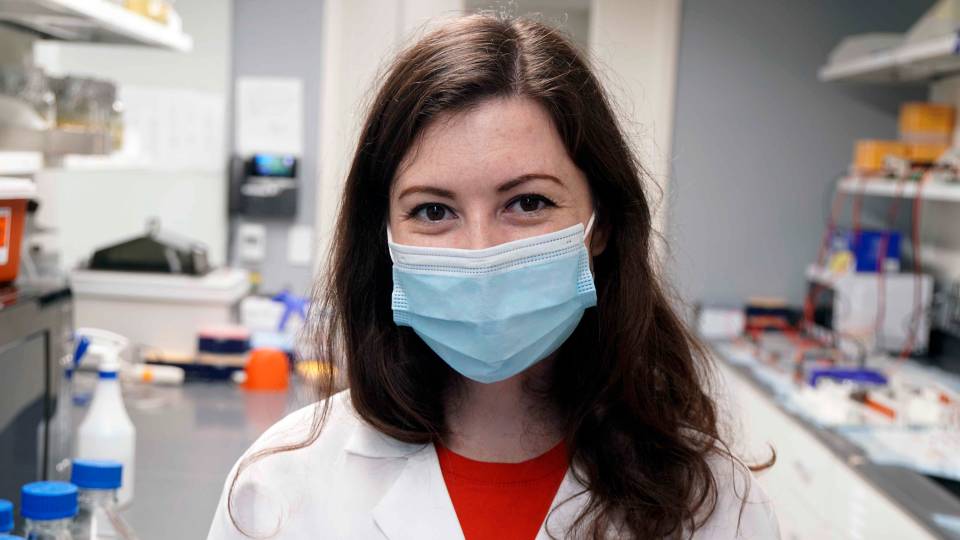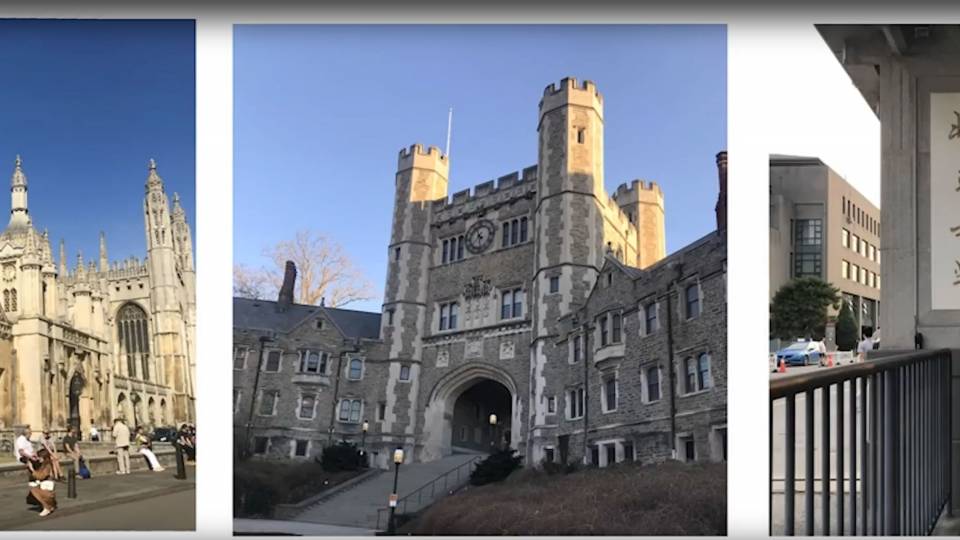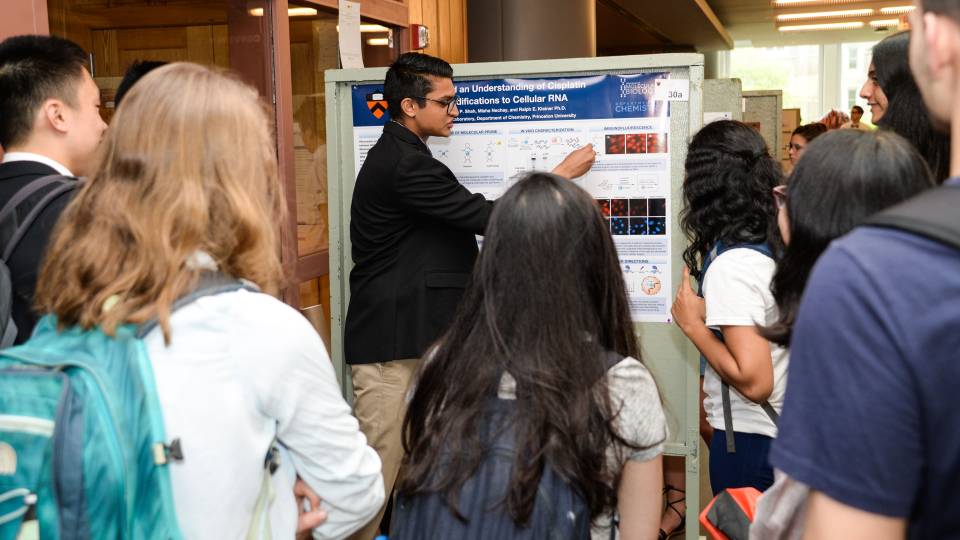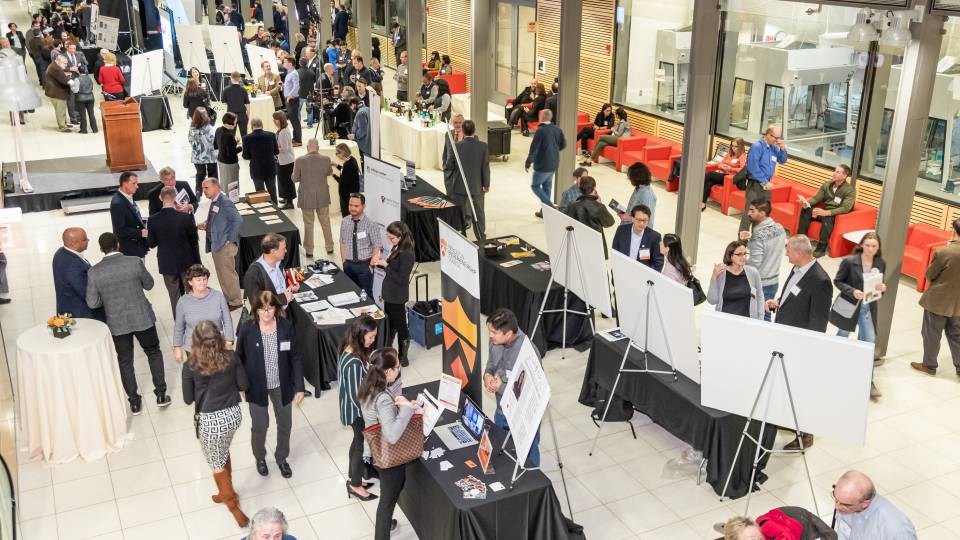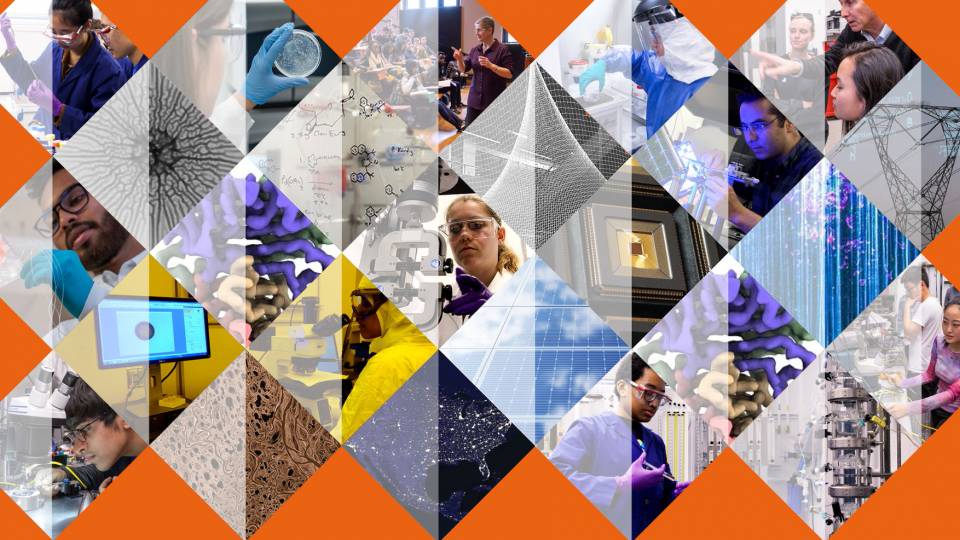In what Dean for Research Pablo Debenedetti called a “joyous return” to a live celebration, 2022 Princeton Research Day wrapped last week with themes of innovation and curiosity-driven research that were on full, in-person display for the first time in three years.
The 7th annual edition showcased the extraordinary range of creative abilities that drives the campus community. Eighteen prizes — which included four new categories this year — were handed out for the most captivating video talks among undergraduates, graduate students, and postdoctoral and early-career researchers from centers and departments throughout Princeton.

Anne-Marie Maman, executive director of the Princeton Entrepreneurship Council, talks to the winners of the Innovation and Entrepreneurial Mindset Award. Maman is pictured with winners Sophia Yoo, a graduate student in electrical and computer engineering, who discussed a software defense system to foil computer attacks (link to video(Link is external)), and Cathy Teng, Class of 2022, whose video explored deploying deep learning to evaluate marine debris (link to video(Link is external)), and Dean for Research Pablo Debenedetti.
“Princeton Research Day highlights and celebrates work at every stage of what we like to think of as the research, innovation, and entrepreneurship continuum,” said Debenedetti, the Class of 1950 Professor in Engineering and Applied Science and professor of chemical and biological engineering.
“At Princeton, curiosity-driven research thrives alongside translational biomedical research, and the eventual transformation of discoveries into technologies that have the potential to improve human life flourishes side-by-side with the digital humanities,” he added. “We support and are inspired by work at every stage in this continuum.”
In a sign of the event’s importance to the University, the offices of six campus entities sponsored PRD 2022, including the offices of the Dean for Research(Link is external) (Link opens in new window), Dean of the College(Link is external) (Link opens in new window), Dean of the Faculty(Link is external) (Link opens in new window), Dean of the Graduate School(Link is external) (Link opens in new window), Provost(Link is external) (Link opens in new window) and, newly on-board for 2022, the Vice President for Campus Life(Link is external) (Link opens in new window).
The event drew three-minute video submissions from over 120 presenters on subjects as disparate as fish migration, traditional medicine healers, and modeling carbon emissions of financial institutions. The awards carried cash prizes of up to $1,500 each, which were contributed by various University partners.
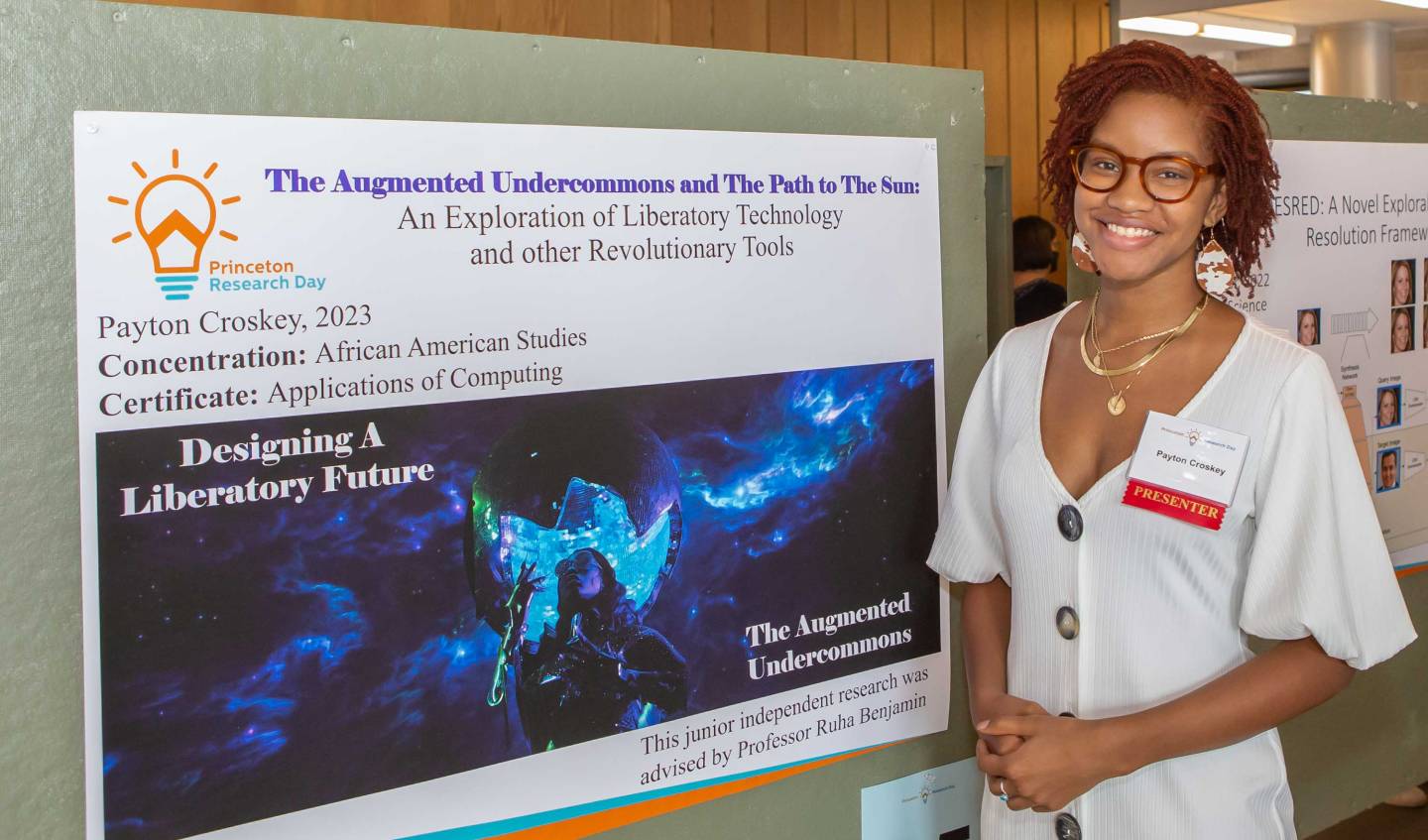
Payton Croskey, Class of 2023, was voted this year’s fan favorite, receiving the FitzRandolph Gate Award for her video presentation, “The Augmented Undercommons and The Path to The Sun: An Exploration of Liberatory Technology and other Revolutionary Tools” (link to video(Link is external)).
Following a mid-day poster and networking session on the 100 Level of the Frist Campus Center, the awards were presented in an entertaining format that had winners joining campus leaders onstage in the multipurpose room for a brief, talk show-styled Q&A.
Vice President for Campus Life Rochelle Calhoun was on-hand to present several awards, including the FitzRandolph Gate Award. Also known as the “fan favorite,” the award went to Payton Croskey, Class of 2023, for her research presentation, “The Augmented Undercommons and the Path to the Sun: An Exploration of Liberatory Technology and other Revolutionary Tools.”
Croskey later lauded the educational opportunities provided by PRD. “I believe everybody should submit their work to PRD,” she said via email. “Finding a way to succinctly summarize my work in a three-minute video prepared me to share my research with people outside of my field of study. This skill is vital in ensuring that the knowledge and discoveries within academia do not remain confined to this privileged space. We must all become better communicators in order to make our work more accessible to the communities around us.”
Second-year graduate student Sophia Yoo won the Innovation and Entrepreneurial Graduate Student Mindset Award for her talk, “SmartCookie: Distributed In-Network SYN Flooding Mitigation.”
“Being able to share my research with a broader audience was a special opportunity. It was challenging to capture the essence of a complex research project in a manner that was accessible, clear and interesting, and have it fit in a three-minute video,” said Yoo. “Yet doing so helped crystallize many of the ideas and bring to the forefront all of the high-level motivations behind the work. And at the end of the day, that’s the really important stuff.”
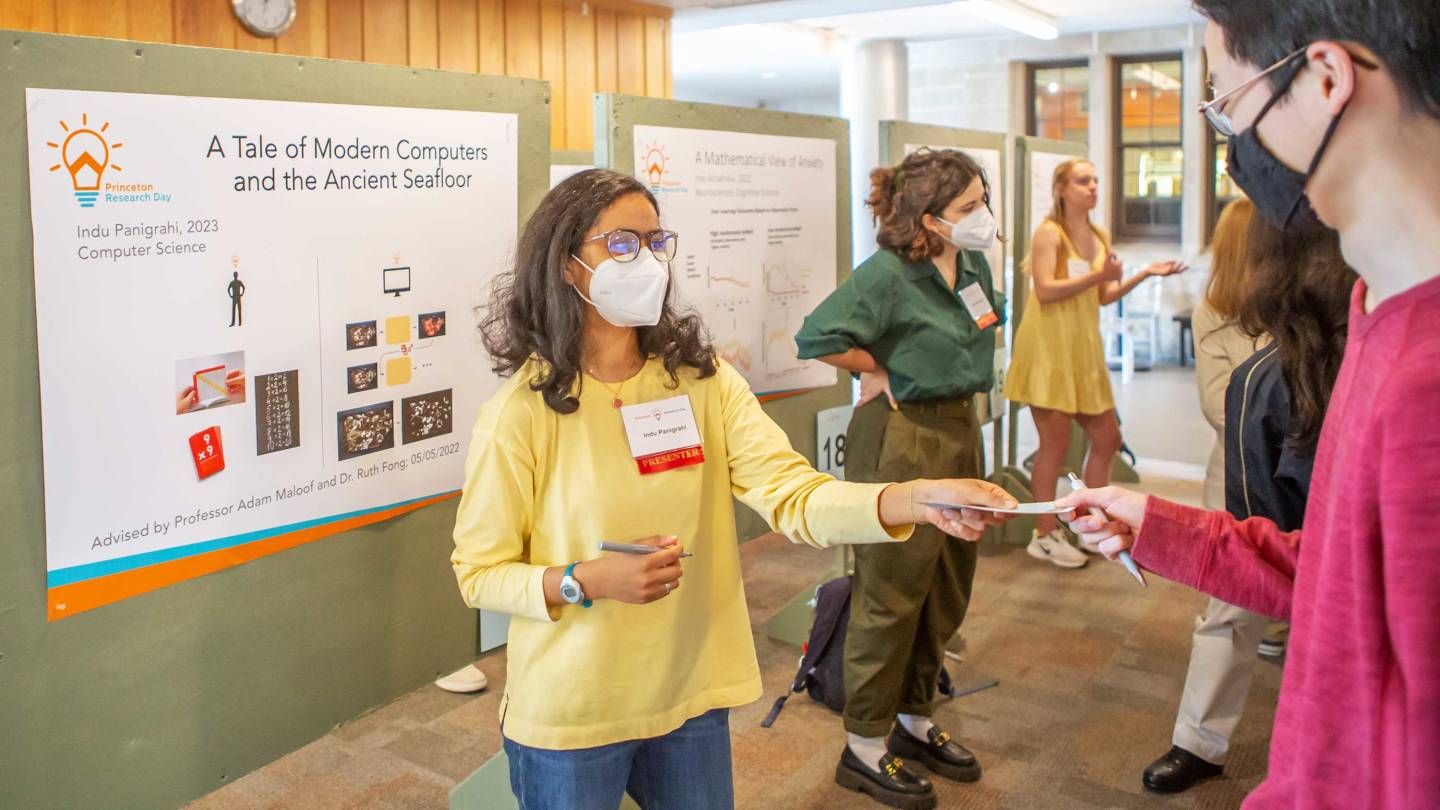
Indu Panigrahi, Class of 2023, hands a card to an attendee who played PRD Eureka, a bingo-like game where participants seek information about the presentations. Panigrahi’s research is on how machine learning models can help identify the 3-D structure of coral reefs. Link to video(Link is external). Panigrahi was one of three winners of the Orange & Black Undergraduate Presentation Award.
Earlier in the day, PRD spectators were treated to a cupcake sculpture with the words “Princeton Research is Delicious” written out in colored icing. It was arranged near the poster sessions where entrants and spectators mingled to discuss the research. A Bingo-like game called Eureka, wherein participants crossed off poster displays they attended, offered prizes and swag.
There was also a handmade harpsichord on display, built during pandemic isolation by Joyce Wei-Jo Chen, a fourth-year graduate student in Historical Musicology and Interdisciplinary Humanities and the self-defined “first female, Taiwanese builder of one of these instruments.” Chen came up with the idea as a way to pivot from international research that was thwarted by pandemic travel restrictions.
Debenedetti reminded the event’s mainstage audience that although the pandemic curtailed campus activities, its research enterprise forged ahead. “For a time that seemed interminable, we had to separate historians from the library, chemists from the lab and astronomers from the telescope,” he said. “But through it all, in spite of the obstacles, research thrived at Princeton.”
For a complete list of winners and other research videos submitted this year, go to the Princeton Research Day website(Link is external) or click here for quick access.(Link is external)
